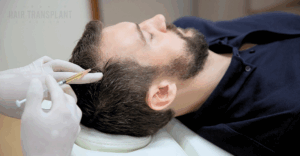Hair transplant surgery can be a turning point for those dealing with hair loss, as it provides hope and confidence. However, it’s important to understand that this surgery is just the beginning of a journey towards complete hair restoration. It’s equally crucial to comprehend the post-transplant phase, which includes recovery, aftercare, and long-term maintenance.
By having a good understanding of these aspects, you can ensure that you achieve and maintain the desired results while also promoting overall scalp health. By embracing a holistic approach, you can confidently embark on your
hair restoration journey with optimism for a brighter future.
What to Do and Avoid After a Hair Transplant?
After undergoing a hair transplant, adhering to proper post-operative care is paramount to ensure optimal healing and successful results. Here are some essential do’s and don’ts to follow:
Do’s:
Follow Doctor’s Advice:
Your surgeon will provide personalized post-operative care instructions tailored to your specific needs. Adhering to these instructions meticulously can significantly impact the success of your hair transplant.
Keep Scalp Clean and Hydrated:
Maintaining cleanliness and hydration of the scalp is crucial for promoting a conducive environment for healing and hair growth. Follow your surgeon’s recommendations for gentle cleansing and moisturizing to aid in the recovery process.
Take Prescribed Medications:
Your surgeon may prescribe medications to prevent infection, reduce inflammation, and promote healing. It’s essential to take these medications as prescribed to support the healing process and minimize complications.
Protect Transplanted Area:
Avoid any trauma or friction to the transplanted area. Be gentle when washing or styling your hair to prevent dislodging grafts and disrupting healing.
Attend Follow-Up Appointments:
Regular follow-up appointments with your surgeon are crucial for monitoring your progress and addressing any concerns or complications promptly. Be sure to attend all scheduled appointments and communicate openly with your surgeon about your recovery.
Don’ts:
Avoid Vigorous Physical Activity:
Refrain from engaging in strenuous physical activities or exercises that could lead to sweating and increased risk of infection. Follow your surgeon’s recommendations for activity restrictions during the initial recovery period.
Steer Clear of Direct Sun Exposure:
Protect your scalp from direct sun exposure, especially during the early stages of recovery and up to 3 months post-op. UV rays can be harmful to the sensitive post-operative scalp and may increase the risk of complications such as sunburn and inflammation.
Do Not Scratch or Pick at Grafts:
It’s natural to experience itching or discomfort in the transplanted area, but resist the urge to scratch or pick at the grafts. Doing so can dislodge grafts and interfere with the healing process, potentially compromising the
results of your transplant.
Avoid Smoking and Alcohol:
Smoking and alcohol consumption can impair healing and increase the risk of complications. It’s advisable to refrain from smoking and limit alcohol intake during the recovery period to support optimal healing and hair growth.
By following these essential do’s and don’ts after your hair transplant surgery, you can enhance the likelihood of a successful outcome and enjoy long-lasting results. Remember to consult with your surgeon if you have any questions or concerns about your post-operative care regimen.
Understanding Pain and Swelling After a Hair Transplant
Post-surgical pain and swelling are typical after a hair transplant but can be effectively managed. Your surgeon may prescribe pain medication to alleviate discomfort during the initial recovery period.
Additionally, applying cold compresses to the affected areas can help reduce swelling and provide relief. It’s essential to follow your surgeon’s instructions for pain management and monitor any changes in discomfort closely.
While mild pain and swelling are expected and generally resolve within a few days, persistent or worsening symptoms should prompt you to contact your surgeon promptly.
They can provide further guidance and address any concerns to ensure a smooth recovery process and optimal results from your hair transplant surgery.
What Happens to Transplanted Hair in the First Few Weeks?
During the initial weeks following a hair transplant, it’s common for transplanted hair to undergo a shedding phase. This shedding is a natural part of the hair growth cycle and occurs as the transplanted follicles adjust to their new environment.
Shedding allows room for new hair growth to emerge from the transplanted follicles. While witnessing hair shedding can be concerning, it’s essential to remain patient and trust the process. With time, new hair will begin to grow from the transplanted follicles, gradually restoring a fuller and thicker appearance to the treated areas.
Timeline and Expectations After a Hair Transplant Surgery
1-3 Months:
During the initial phase post-surgery, patients typically observe the emergence of new hair growth. While this hair may appear thin and curly at first, it signifies the beginning of the regrowth process.
4-6 Months:
Around the four to six-month mark, patients often experience significant improvement in hair density and texture. The newly transplanted hair starts to become thicker and more closely resembles natural hair.
12 Months:
By the end of the first year after the hair transplant surgery, patients can expect to see the full results of the procedure. The transplanted hair has fully grown in, providing a natural and denser appearance to the treated areas.
How to Take Care of Your Scalp and Transplanted Hair Post-Surgery:
Gentle Washing:
It’s crucial to use a mild shampoo and handle the scalp with care. Avoid vigorous rubbing, as this can dislodge grafts and hinder the healing process.
Hydration:
Keeping the scalp adequately moisturized is essential for promoting healing and maintaining scalp health. However, it’s important not to over-wet the scalp, as excessive moisture can lead to irritation and potential complications.
Avoid Chemicals:
Refrain from using hair dyes, styling products containing harsh chemicals, or undergoing chemical treatments for several months following the hair transplant surgery. These substances can irritate the scalp and interfere with the healing process.
Tips for Optimal Recovery After a Hair Transplant
Balanced Diet:
Consuming a diet rich in nutrients like protein, vitamins, and minerals is essential for supporting the body’s healing processes and promoting healthy hair growth. Incorporate plenty of fruits, vegetables, lean proteins, and whole grains into your meals.
Hydration:
Staying adequately hydrated is crucial for overall health and optimal recovery after surgery. Aim to drink plenty of water throughout the day to support healing and maintain scalp health.
Sufficient Rest:
Adequate rest is essential for the body to recover effectively from the stress of surgery. Aim for seven to eight hours of sleep per night to promote healing and reduce stress levels, which can impact hair growth.
Conclusion
Post-hair transplant care is a vital aspect of the overall treatment journey, requiring patience, adherence to guidelines, and self-care. By following proper post-operative care instructions and adopting healthy habits, patients can optimize their recovery and enjoy the flourishing results of their hair transplant surgery. With time and dedication to proper care, individuals can look forward to not only new hair growth but also a renewed sense of confidence and well-being.





